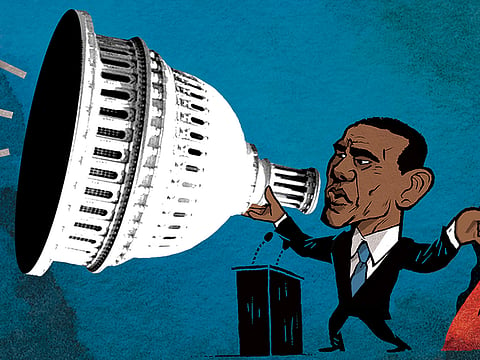Obama’s speech brings home truths
The fact remains it’s unconstitutional for the president to go to war in Syria without Congressional approval

If you listened closely during United States President Barack Obama’s speech to his nation on Sunday night, you would have heard him refer to the fact that the US war against Daesh (the self-proclaimed Islamic State of Iraq and the Levant) — which is well over a year old at this point — is illegal and unconstitutional.
He didn’t phrase it like that of course, but he did remind Americans that Congress had not authorised any military action against Daesh despite the fact that the US had been dropping bombs on multiple countries in an effort to stop Daesh since August of 2014, and despite the fact that such military action was required by both the law and the US Constitution.
Here’s what Obama did say about the subject on Sunday night: “Finally, if Congress believes, as I do, that we are at war with [Daesh], it should go ahead and vote to authorise the continued use of military force against these terrorists.
“For over a year, I have ordered our military to take thousands of air strikes against [Daesh] targets. I think it’s time for Congress to vote to demonstrate that the American people are united and committed to this fight.”
He framed congressional authorisation of the war against Daesh as a solidarity or symbolic issue — like the US Congress would be showing the American public unity or something — but it’s much more consequential than his deceptive wording allows. According to Article I, section eight of the US Constitution, only Congress has the power to declare war, not the executive branch, and under the War Powers Act passed after the Vietnam War, Congress must authorise war within 90 days after any combat mission begins.
For the past year and four months, the US administration has been pretending that the 2001 Authorisation for Military Force (AUMF), which made it legal to wage war against those who perpetrated the 9/11 attacks, somehow makes it okay to wage an indefinite, worldwide war against Daesh. But Daesh did not exist in 2001 and has been enemies with Al Qaida (the group that committed 9/11) for years. Still, the 2001 AUMF is being used to fight Daesh in Iraq and Syria, despite the fact that Al Qaida was almost exclusively operational in Afghanistan when Congress first authorised military action.
It makes no logical sense to claim that the authorisation to engage in military action against Al Qaida in Afghanistan in 2001 applies to Daesh in Syria in 2015, yet that is supposed to be the argument to which the White House lawyers are clinging.
The theory that the ongoing military action against Daesh is illegal — no matter what you think the merits of fighting the terrorist organisation are — isn’t just my opinion: It’s the opinion of legal scholars across the political spectrum. Even the former head of the Office of Legal Counsel under the Bush administration Jack Goldsmith has questioned Obama’s unprecedented claims to executive authority. Yet, in the past year, the illegality of the military strikes in Syria and Iraq has been routinely ignored by almost all members of Congress, save a select few.
What Obama said in his speech on Sunday is nothing new. He has been half-heartedly calling on Congress to authorise the war since January. But the White House has put forth no language of their own for a bill that would satisfy their requirements, and the administration has made clear they don’t think they really need legislation any ways. Their position is, essentially: legal authority would be nice, but we can just pretend we already have it.
It’s hard to figure out who is more to blame here: The administration, which has foisted an extremely dubious legal theory on the American public; or Congress, which has been so terrified of doing its job and casting a vote for or against this war that they have continually done everything in their power to pretend that they don’t have to.
Sure, writing a resolution to authorise military force against Daesh would be fraught: Given the war-hungry atmosphere and just how many Republicans (and some Democrats) would want to write it as broadly as possible and leave it in effect for an unlimited amount of time while calling anything less surrendering to the terrorists, a new AUMF could end up giving the administration — or future administrations — more power to wage a broader war, rather than less.
But any decision — or indecision — could have significant consequences beyond 2016: Republican front-runner Donald Trump has boasted he would “bomb the [expletive] out of Daesh” and, disturbingly, said the US military should kill their families as well. Ted Cruz bragged he would “carpet bomb” the Middle East. And, if you take away the rhetorical flourishes, it’s hard to tell how Hillary Clinton’s policy on Daesh is any less hawkish than the Republicans’.
The editors of Just Security put together a detailed outline of what a limited authorisation against Daesh could look like. It includes a demand that the authorisation be geographically and time-limited; remain in keeping with international law; force the administration to delineate objectives and report its progress in meeting those objectives; and be limited to Daesh.
Unfortunately, it’s probably much too rational for this US Congress to pass; it seems hardly worth hoping that this administration, or any administration, accept legislative limits on its power to wage war if it won’t accept constitutional ones. But at least they could admit that there are some.
— Guardian News & Media Ltd


